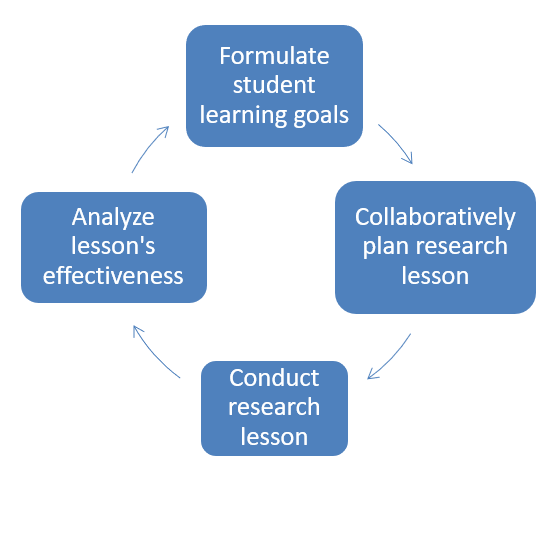SU Noyce Lesson Study Model
 To supplement their SU STEM teacher preparation programs, SU Noyce scholarship recipients participate in lesson study during their junior and senior years. Lesson study is a structure for systematic classroom research. Historically, it has been part of the fabric of teacher professional development in Japan, and over the past two decades it has steadily become more prominent in the U.S. (Lewis, 2016). Lesson study consists of cycles that involve setting goals for student learning of a central idea within the school curriculum, collaboratively planning a research lesson to address the goals, conducting the research lesson while lesson study group members observe and gather classroom data, and holding a debriefing session to analyze the research lesson’s effectiveness in supporting students’ learning (Lewis & Hurd, 2011). The debriefing session may lead to further refinement of the lesson during another cycle of lesson study, or it may lead to formation of a new, related lesson. The purpose of lesson study is not necessarily to build a large library of ready-made lessons, but to provide a structured setting for teachers to build and refine their knowledge for teaching.
To supplement their SU STEM teacher preparation programs, SU Noyce scholarship recipients participate in lesson study during their junior and senior years. Lesson study is a structure for systematic classroom research. Historically, it has been part of the fabric of teacher professional development in Japan, and over the past two decades it has steadily become more prominent in the U.S. (Lewis, 2016). Lesson study consists of cycles that involve setting goals for student learning of a central idea within the school curriculum, collaboratively planning a research lesson to address the goals, conducting the research lesson while lesson study group members observe and gather classroom data, and holding a debriefing session to analyze the research lesson’s effectiveness in supporting students’ learning (Lewis & Hurd, 2011). The debriefing session may lead to further refinement of the lesson during another cycle of lesson study, or it may lead to formation of a new, related lesson. The purpose of lesson study is not necessarily to build a large library of ready-made lessons, but to provide a structured setting for teachers to build and refine their knowledge for teaching.
Lesson study groups for the SU Noyce project do their work in Wicomico County middle and high schools. These groups consist of 5 members who complete one cycle of lesson study per semester. Each group has one school-based Wicomico County mentor teacher, three SUNRISE scholarship recipients, and one first year or sophomore selected for a SUNRISE internship.
| Information | 2019-2020 | 2020-2021 | 2021-2022 | 2022-2023 |
|---|---|---|---|---|
| Lesson study groups | 4 | 8 | 8 | 4 |
| Junior/senior SUNRISE scholarship recipients | 12 (cohort 1) | 12 (cohort 1) & 12 (cohort 2) | 12 (cohort 2) & 12 (cohort 3) | 12 (cohort 3) |
| Wicomico County lesson study mentors | 4 | 8 | 8 | 4 |
| First Year/sophomore SUNRISE interns | 4 | 8 | 8 | 4 |
| Members per lesson study group | 5 | 5 | 5 | 5 |
Furthermore, they are responsible for designing and conducting pre- and post-assessments of students’ learning. SU Noyce interns help video record lessons, conduct and score pre- and post-assessments, facilitate completion of paperwork, and gather needed copies and materials for lessons. They contribute their ideas to the group as collaborative planning and analysis of lessons take place. These activities help SU Noyce scholarship recipients and interns become reflective practitioners who make instructional decisions by carefully analyzing classroom data.
